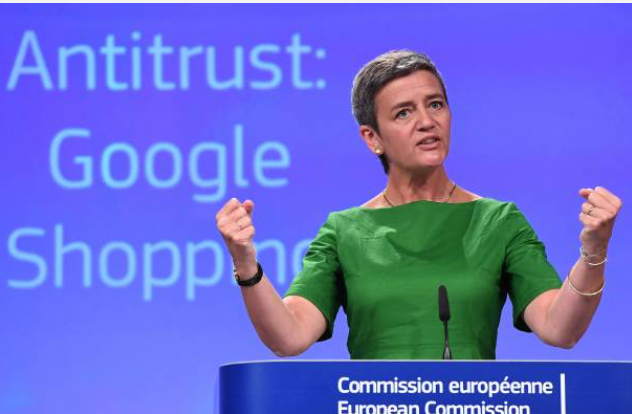Antitrust versus the Big Tech : What’s happened and what to expect.
Antitrust regulators, whether it be the US Department of Justice (DoJ) or the European commission have hit big tech companies for the first time in decades. Indeed, Antitrust authorities have struck back against tech giants such as Apple, Google and Microsoft kickstarting what could be the end of Silicon Valley’s market dominance.
The US department of Justice struck its first blow last week, where a US federal judge found Alphabet’s Google guilty of spending hundreds of millions of dollars into monopolising the Google search engine in the search of boosting advertising revenue. The ruling follows the establishment that Google, through the payments of billions of dollars a year in anti-competitive agreements, cemented Google as the default search engine. This case strikes at the heart of the Californian giant as the revenue from search based advertising amounts to approximately half of its global revenue in 2023.
Hitting two giants with one stone, this decision also concerns Apple, whose agreement with Google provides an example of the exact anti-competitive agreements being targeted. Indeed, the district of justice accuses Apple of having received billions of dollars in payments in order to meeting Google as a default search engine across all of its devices. This is grave news for Apple considering Google’s payments make up a big chunk of Apple’s 85 billion dollar a year service business[1]. So, although Apple is not a defendant and so not the object of this case, this shows the rebounding effect of litigation cases like these and how profound their impact can be within the big tech.
The impact of this decision on its own cannot be fully evaluated as Google await a second trial later this year in order to assess the potential remedies the search giant will have to undertake as a result of this. However, the DoJ’s victory may have already made its mark with Alphabets shares closed 4.6% lower the following Monday, displaying a potential lack of investor confidence. With the case far from closed, it will be interesting to see Google’s response and whether the DoJ can build on from this early blow.
The European Commission is also taking action against the big tech through a similar step up in antitrust challenges. Earlier this summer, most significantly, the commission hit fellow tech giant Microsoft with anti-competitive charges following its bundling of Microsoft teams within the office suite.[2] This claim brought by rival competitor Slack, stems from the facts that Teams has an anti-competitive distribution advantage due to the fact that it is included within Microsoft Office and Microsoft 365. This meant that Microsoft was somewhat “ force installing it for millions, blocking its removal and hiding the true cost to enterprise customers”[3]. This led to the European Commission filing charges against the tech behemoth wafter establishing that Microsoft was not taking sufficient action to resolve the problem.
Although Microsoft has not been found guilty of these charges, it does display the momentum shown by antitrust regulators within the EU after a slow and inefficient previous decade. This is most likely linked to the Digital Markets Act 2022, the newest weapon in the EU commission’s arsenal, a piece of legislation aims at aiding antitrust authorities in their war against the big tech. More specifically, this act enables larger fines (10% of global revenue, 20 for repeat offenders) if a company does not take significant action to remedy unfair practices. With this act in hand, one can understand the European Commission’s eagerness to tackle even the world leader in market capitalisation and is likely to change the European antitrust scene in the long run.
From a more global point of view, the wake of antitrust regulators across the US and Europe could threaten the dominance of big tech companies within their respective sectors. In addition, an increased scrutiny upon anti-competitive practices could lead to an increase in successful tech startups and a boost of entrepreneurial confidence across the western world. Whichever way the balance swings, it will be interesting to see what results from the increased competitiveness concern regarding big tech companies for the economy as a whole.
[1] Palma, S., Acton, M. and Morris, S. (2024) Google loses landmark US antitrust case over search dominance, Financial Times. Available at: https://www.ft.com/content/8896a83a-74ac-49e5-9296-3545b1094919?accessToken=zwAGH7lykOwYkdOIlqg6dKxJ5dOSljVFsQlJGQ.MEQCIAj-_HW-IpuZn1UNEzEPeWWYR5PZiznC0XMXMO0v3y4gAiBUO4GFryfa_RcFapU6iD9KiW5EfjOYw_9bKIzGh63d6A&sharetype=gift&token=d8a28bbf-f447-4176-b8f2-9fd3c707df04 (Accessed: 16 August 2024).
[2] Espinoza, J. (2024) EU charges Microsoft with antitrust violations over teams, Financial Times. Available at: https://www.ft.com/content/eb83bb45-84b3-4c58-9589-684029d23243?accessToken=zwAGH7lxZFbgkdPrg7tFhLNMWNOViWhAKdIyQw.MEUCIARaovuhP8Zk9LDoADCMJhvhiJX2foUNyyobowajR_UGAiEA_-i0SIWw37I7yd7YQZzyFqEOnGikOmbk-i6qjUwPLWA&sharetype=gift&token=9e5428a4-4377-47bc-8d1e-b81a2e97c132 (Accessed: 16 August 2024).
[3] Warren, T. (2024) Microsoft charged with EU antitrust violations for bundling teams, The Verge. Available at: https://www.theverge.com/2024/6/25/24185467/microsoft-teams-eu-bundling-antitrust-violations (Accessed: 16 August 2024).






